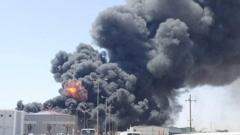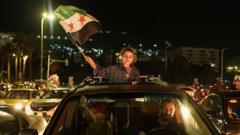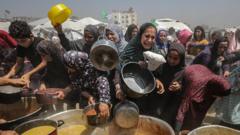#### The conflict in Sudan intensifies as the Rapid Support Forces shift strategies and increase drone warfare, highlighting the dire humanitarian crisis and the complex role of foreign involvement.
### Rising Drone Warfare Escalates Sudan's Civil Conflict

### Rising Drone Warfare Escalates Sudan's Civil Conflict
#### Paramilitary RSF Launches Unprecedented Drone Strikes Targeting Key Infrastructure in Port Sudan
In a startling escalation of the civil war in Sudan, the Rapid Support Forces (RSF) have commenced a series of drone strikes on Port Sudan, a city previously regarded as a relatively secure area. This aggressive tactic marks a new phase in the conflict following the army's reclamation of Khartoum from paramilitary control. Experts describe this maneuver as a "shock and awe campaign," aimed at dismantling critical infrastructure while forcing a humanitarian crisis on civilians.
Alan Boswell, a specialist in the Horn of Africa from the International Crisis Group, notes that these drone strikes represent a significant shift in military strategy for the RSF, highlighting their capabilities despite territorial setbacks. The advanced drone operations have resulted in power outages and water shortages for the residents of Port Sudan, a hub for humanitarian activities and government officials.
Since the onset of the war, which stems from a power struggle between the Sudanese Armed Forces (SAF) and the RSF, drone warfare has evolved significantly. Although drones facilitated the army’s earlier offensives, the RSF's recent actions demonstrate their adaptation and increased reliance on aerial technology. By targeting military installations and civilian structures within army-controlled regions, the RSF aims to showcase their operational resilience and shift the narrative away from the SAF's perceived triumph.
Analysts emphasize that the RSF's newfound capability to strike deep into territory controlled by the army signifies a transformation in the dynamics of warfare in the region. As they demonstrate their aerial prowess, the RSF seeks to project power without the necessity of conventional ground movements, aiming to position themselves as a formidable force against the SAF.
The recent drone attacks have raised alarms about the humanitarian conditions worsening in Sudan, with the UN estimating an increasing number of civilians forced to flee their homes as conflicts intensify. Additionally, there are serious challenges regarding the provision of aid, as the RSF's renewed emphasis on aerial assaults complicates relief efforts amid the ongoing humanitarian disaster.
Several reports have implicated foreign nations in supplying drones to both factions, complicating the conflict further. The SAF accuses the UAE of providing advanced military support to the RSF, while other analyses raise concerns about Iranian assistance to the army. This international dimension underscores the complexities of the war, transforming it into a broader conflict involving geopolitical interests that could prolong the suffering of Sudanese civilians.
As the RSF maintains its offensive, the ongoing conflict has the potential to destabilize the region even further. Observers warn that without substantial diplomatic intervention, the war is likely to persist for an extended period, underscoring the pressing need for a resolution to one of Africa’s most dire humanitarian crises.




















